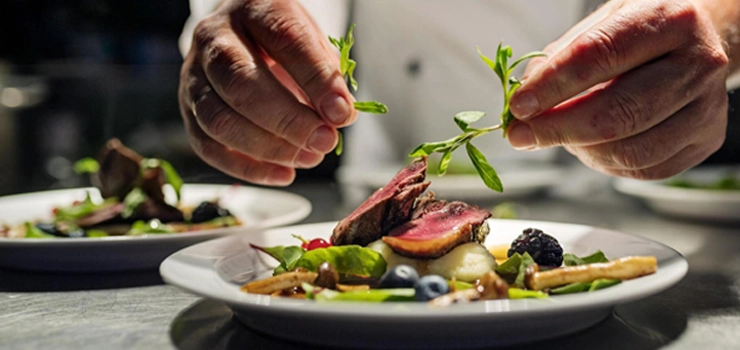Table of Contents
Embarking on the journey to secure your dream Culinary Internship requires strategic planning and a dash of creativity. Let’s explore key steps to help you stand out in the competitive culinary world.
Finding Your Perfect Fit: What Kind of Culinary Internship is Right for You?
Choosing the right culinary internship is like selecting the finest ingredients for a recipe. Start by identifying your culinary passion and preferred kitchen environment. Whether it’s a bustling restaurant, a catering service, or a high-end hotel, finding the perfect fit is crucial. Research various internships, considering their specialties, work culture, and the skills you want to hone.
When selecting your dream culinary internship, remember that each experience is unique. Culinary internships can range from hands-on kitchen roles to management-focused positions. Take the time to understand the nuances of each opportunity, aligning them with your career goals and aspirations.
Stand Out From the Whisk: Crafting a Killer Culinary Internship Resume
Your resume is the first taste employers get of your skills and experiences. To make it stand out, tailor your resume to the specific internship you’re applying for. Highlight relevant skills, such as knife techniques, menu development, or pastry arts. Incorporate keywords from the internship description to catch the recruiter’s eye.
A killer culinary internship resume should be concise, showcasing your culinary journey and accomplishments. Don’t forget to include any relevant certifications, such as ServSafe or culinary degrees. Additionally, emphasize any culinary-related extracurricular activities or volunteer work. Make your resume a feast of your culinary expertise, leaving the hiring manager hungry for more.
Master the Art of the Stage: Writing a Cover Letter Chefs Can’t Resist
A well-crafted cover letter is your golden ticket to securing a coveted culinary internship. Begin by addressing the hiring manager personally and expressing your genuine passion for the culinary arts. Dive into specific experiences that highlight your skills, mentioning any noteworthy chefs you’ve trained under or renowned kitchens you’ve worked in.
In your cover letter, convey how your unique culinary perspective can contribute to the internship’s success. Use this opportunity to showcase your personality, emphasizing qualities like creativity, adaptability, and a strong work ethic. A compelling cover letter should leave the reader eager to bring you into their culinary world.
Practice Makes Perfect: Acing Your Culinary Internship Interview
Preparing for a culinary internship interview is like perfecting a recipe – practice is key. Research common culinary interview questions and rehearse your responses. Showcase your knowledge of different cuisines, culinary trends, and your ability to handle high-pressure situations in a kitchen.

During the interview, Culinary Internship recruiters appreciate enthusiasm and genuine passion. Discuss specific culinary challenges you’ve overcome and emphasize your commitment to continuous learning. Share your experiences working in a team and highlight instances where you’ve taken the lead in the kitchen. By demonstrating both technical skills and a strong work ethic, you’ll leave a lasting impression.
Network Your Way to the Top: Building Connections in the Culinary World
In the culinary industry, connections are as vital as the perfect spice blend. Attend culinary events, workshops, and networking mixers to meet professionals in the field. Join culinary associations and online forums to engage with like-minded individuals. Building a robust culinary network can open doors to internships, mentorships, and even job opportunities.
When networking, don’t be afraid to share your passion and career goals. Connect with chefs, culinary educators, and industry influencers. A well-established network can provide valuable insights, recommendations, and even serve as a reference during your internship application process.
Portfolio Powerhouse: Showcasing Your Culinary Skills and Passion
Your culinary portfolio is a visual feast that allows employers to savor your skills. Include high-quality photos of dishes you’ve created, along with detailed descriptions highlighting your culinary techniques and creativity. Arrange your portfolio in a way that tells a story, showcasing the evolution of your culinary journey and the diversity of your skills.
In addition to dishes, consider including any culinary-related projects, collaborations, or events you’ve been a part of. A portfolio that reflects your dedication and passion for the culinary arts will leave a lasting impression on potential employers.
Spice Up Your Application: Highlighting Relevant Experience (Even Outside the Kitchen!)
Culinary skills extend beyond the kitchen, and employers appreciate a well-rounded candidate. Highlight any relevant experiences outside traditional culinary settings, such as food blogging, event planning, or even managing a small catering business. Showcase how these experiences have shaped your culinary perspective and contributed to your skill set.
In your application, draw connections between your diverse experiences and how they uniquely position you for success in the culinary internship. A candidate with a broad range of skills and a unique perspective can bring fresh ideas and creativity to the kitchen.
Availability All-Star: Demonstrating Flexibility and Commitment
Flexibility and commitment are key ingredients in the recipe for success in a culinary internship. Clearly communicate your availability and willingness to adapt to the demands of a fast-paced kitchen environment. Showcase your commitment by detailing any previous experiences where you’ve gone above and beyond to ensure the success of a culinary project or event.
In your application, express your eagerness to learn and contribute to the culinary team. A candidate who can seamlessly integrate into the kitchen, adapt to changing circumstances, and contribute positively to the team dynamic is highly valuable in the culinary world.
Salary Savvy: Understanding Internship Compensation and Benefits
Understanding the financial aspects of a culinary internship is essential for making informed decisions. Research the compensation structure, including any stipends, bonuses, or benefits offered. While many internships may not offer substantial monetary compensation, they often provide valuable hands-on experience, mentorship opportunities, and networking benefits.
Consider the long-term benefits of the internship, such as skill development, industry connections, and potential job opportunities upon completion. Factor in the overall value of the experience, as it goes beyond monetary compensation and contributes significantly to your culinary career trajectory.
Prepping for Success: Essential Questions to Ask Before Accepting an Internship
Before accepting a culinary internship, ensure you are well-prepared by asking insightful questions. Inquire about the specific responsibilities, the learning opportunities provided, and the mentorship structure within the kitchen. Clarify expectations regarding work hours, potential overtime, and any additional commitments.
Ask about the potential for advancement within the organization after completing the internship. Understanding the long-term opportunities and career trajectory can help you make an informed decision. By asking thoughtful questions, you demonstrate your commitment to success and a proactive approach to your culinary career.
In conclusion, landing your dream culinary internship in 2024 requires a blend of passion, preparation, and perseverance. By finding the perfect fit, crafting an outstanding resume and cover letter, mastering the interview, building a strong network, showcasing your skills, and addressing essential considerations, you’ll be well on your way to a successful culinary journey. LondonbTimes.com wishes you the best in securing the culinary internship that will elevate your skills and ignite your culinary career.




